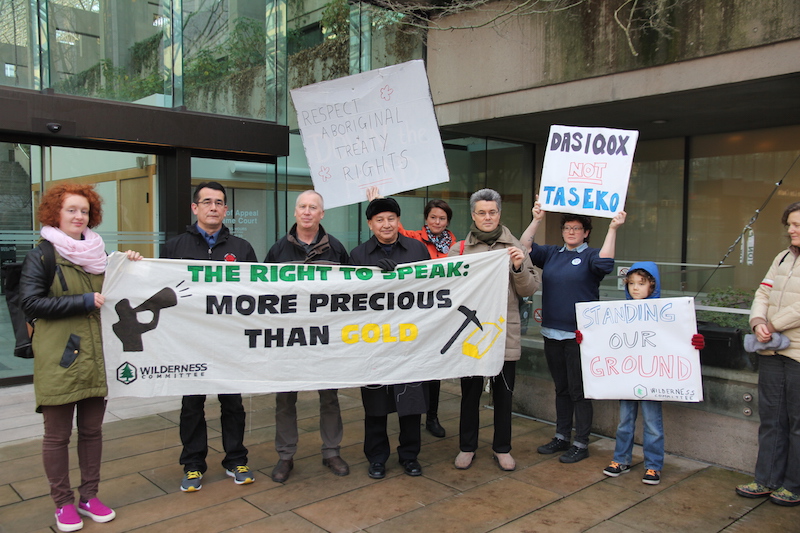A crowd gathered in front of B.C.’s law court in Vancouver on Monday morning in support of the Wilderness Committee. It was the first day of a lawsuit instigated by Taseko Mines Limited, which is suing the environmental organization for defamation.
Recent attention has been turned to the use of lawsuits to harass activists — dubbed “Strategic Lawsuits Against Public Participation” (SLAPPs) with the “frivolous legal battle” launched against Burnaby residents opposing the Kinder Morgan pipeline expansion. During Burnaby Mountain protests, the activists had spoken out against Kinder Morgan’s proposal to triple the bitumen transported through the Trans-Mountain pipeline.
When it comes to SLAPPs, “the process is the punishment,” Micheal Vonn of the BC Civil Liberties Association (BCCLA) stated at the courthouse gathering in support of the Wilderness Committee. BCCLA argues that what B.C. needs is anti-SLAPP legislation, which the province had for a brief period in 2001. B.C. is behind the times. Quebec introduced anti-SLAPP suit legislation in 2009 and Ontario has also recently reintroduced an anti-SLAPP bill after a previous attempt died on the order paper with last year’s election call.
Taseko’s proposed “New Prosperity” copper-gold mine at Fish Lake has been rejected twice through Canada’s environmental assessment process (CEAA) due to ongoing Indigenous opposition and serious environmental risks. “A SLAPP suit against our friends the Wilderness Committee is atrocious,” said Tsilhqot’in leader and Xeni Gwet’in councillor Marilyn Baptiste. “The Tsilhqot’in opposition to both Prosperity Mine proposals was voiced by elders, youth and leaders, and experts agreed in both CEAA panel reviews. Our voices echo this position every day at the thought of anyone destroying our wild rainbow trout or grizzly bear habitat and not considering our future generations.”
Last week, the province of B.C. extended Taseko’s Environmental Assessment Certificate for the twice rejected mine. The Tsilhqot’in Nation responded with their disappointment: “No matter what, this project is dead. The Tsilhqot’in are the only First Nation in Canada that have proven Aboriginal title in the courts. The extension of this certificate should be illegal. Denying this extension would have shown respect in regards to our Title negotiations with the Province,” stated Tribal Chairman Chief Joe Alphonse.
President of the Union of British Columbia Indian Chiefs (UBCIC) Grand Chief Stewart Phillip said, “The fight to protect Teztan Biny is not just about a mine, it’s about upholding First Nations’ title and rights.” The Tsilhqot’in have plans of their own for Fish Lake and on October 4th of last year announced the Dasiqox Tribal Park. Dasiqox is located adjacent to the title area awarded to the Tsilhqot’in by the Supreme Court of Canada in its ruling of June 26th, 2014. Chief Phillip voiced support for the Dasiqox project Monday morning, saying, “We continue to stand by and support the Tsilhqot’in people to make sure the area becomes a Tribal Park.”
In light of the Tsilhqot’in Nation’s opposition to the rejected mine proposal and the mining company’s litigation efforts, UBCIC Vice President Chief Bob Chamberlin said, “If the only answer is yes [to the mine], then the process is a joke.”
The hearing for Taseko’s lawsuit against the Wilderness Committee is expected to last two weeks.



